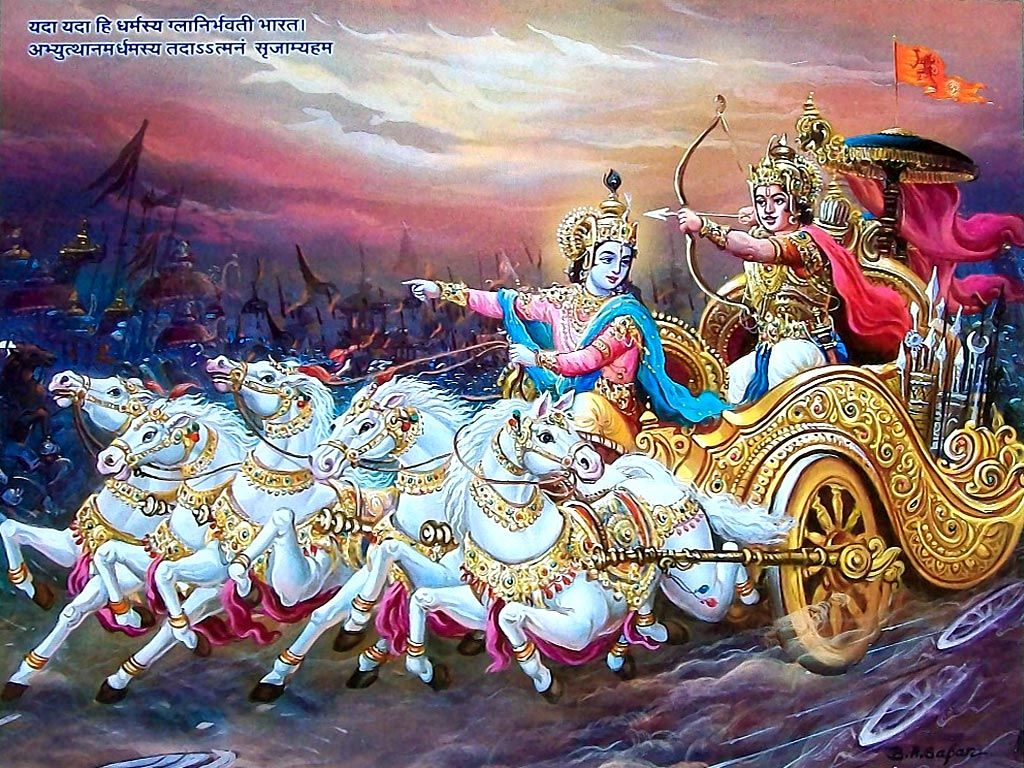A Study of the Bhagavadgita :12.2 - Swami Krishnananda.
========================================================================
========================================================================
Thursday, June 16, 2022. 06:00.AM.
Chapter 12: Communing with the Absolute through the Cosmic Tree - 2.
=========================================================================
The concept of God's personality arises on account of our impossibility to get over the consciousness of our own personality. God's personality, as we conceive it, is a cosmic counterpart of our own individual personality. It is an extension of our own notion of what we are, so that God would look like a big person and something like our own personality. We cannot think in any other manner. If we want to associate immense capacity and great knowledge and power with God, the only thing that people can think is that He has multiple powers. His eyes are everywhere, His hands are everywhere, His feet are everywhere, as the Gita tells us. Inasmuch as our hands or eyes cannot be everywhere, we have to associate God with everywhereness of even the limbs. We are ignorant, and therefore God has to be all-knowing. We are unhappy; therefore, God is bliss. We are in only one place; therefore, God is everywhere. There is an opposite, counter-correlative aspect of God's conception of us in our endeavour to think Him.
So in the earlier stages of spiritual practice, it is no use on the part of any seeker to jump over his own skin and try to be infinite if the Infinite becomes only a conceptual object, an abstraction to the conceiving mind. Yet, we may maintain it as a kind of theoretical possibility. One day or the other, this finitude of ours may melt down and the Infinite may take possession of us. It is a blessedness we may await. But in the earlier stages, God-consciousness will take the form of a blessed, benevolent father, mother, friend, guide, philosopher – whatever you call it. This is the answer Bhagavan Sri Krishna gives to Arjuna's question: Which is the better way for a spiritual seeker – the pursuit of the impersonal Absolute, or devotion to a personal God?
The answer is that both are equally good, under different circumstances and conditions. But the body-consciousness of an individual will not permit an immediate communion of itself with the infinite Absolute, so love of God is what is available to us as a redeeming factor. Meditation should be carried on in this way, on the Supreme Being, the Creator of the Universe. What kind of meditation? How are we to adjust our mind to the thought of God?
As I mentioned, these ways are called Yoga. We have four Yogas mainly, as you must have heard – Jnana Yoga, Bhakti Yoga, Raja Yoga and Karma Yoga. Four verses, commencing with the verse mayy eva mana ādhatsva mayi buddhiṁ niveśaya, nivasiṣyasi mayy eva ata ūrdhvaṁ na saṁśayaḥ (Gita 12.8), briefly adumbrate the nature of the practice of the four Yogas: Concentrate yourself on Me only, to the exclusion of everything else. Let your mind be devoted to Me and the intellect dedicated to Me, and you shall reside and abide in Me. The abiding of oneself in God is the crucial point in Jnana Yoga.
When we tried to understand the meaning of jnanin on an earlier occasion, we observed that a jnanin expects nothing from God because he wants God only. To want God is to abolish oneself as a person because of the infinite inclusiveness of God. So the abiding of oneself in God implies, would suggest, a total surrender of oneself to the extent of annihilation of personality itself; otherwise, abiding in God would be difficult. You would be abiding in God as a separate entity there, and the infinitude of God would not permit that situation.
So this slokam is a suggestion for Jnana Yogam :
"Seeing Everything Everywhere."
To be continued .....
=========================================================================






Comments
Post a Comment